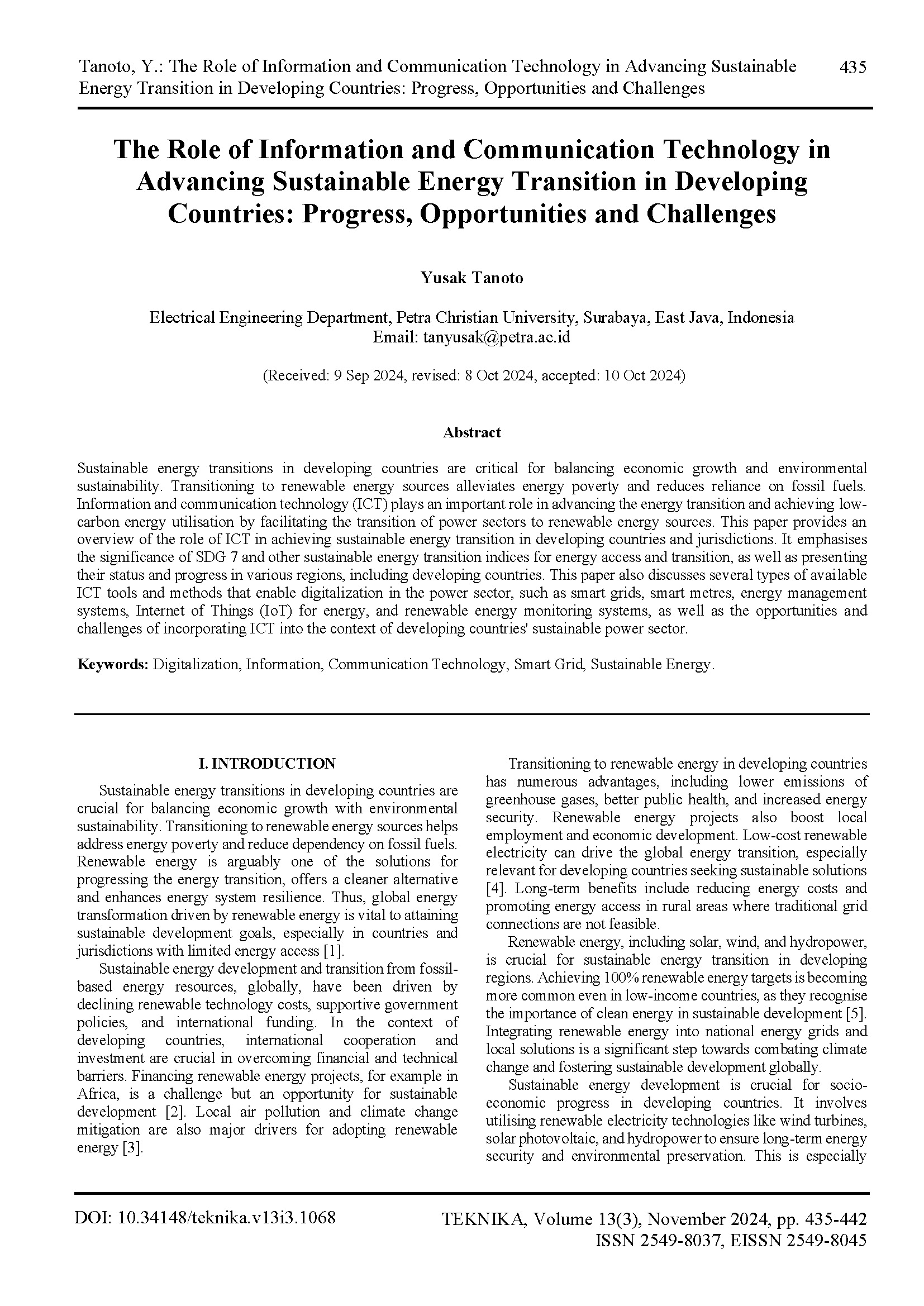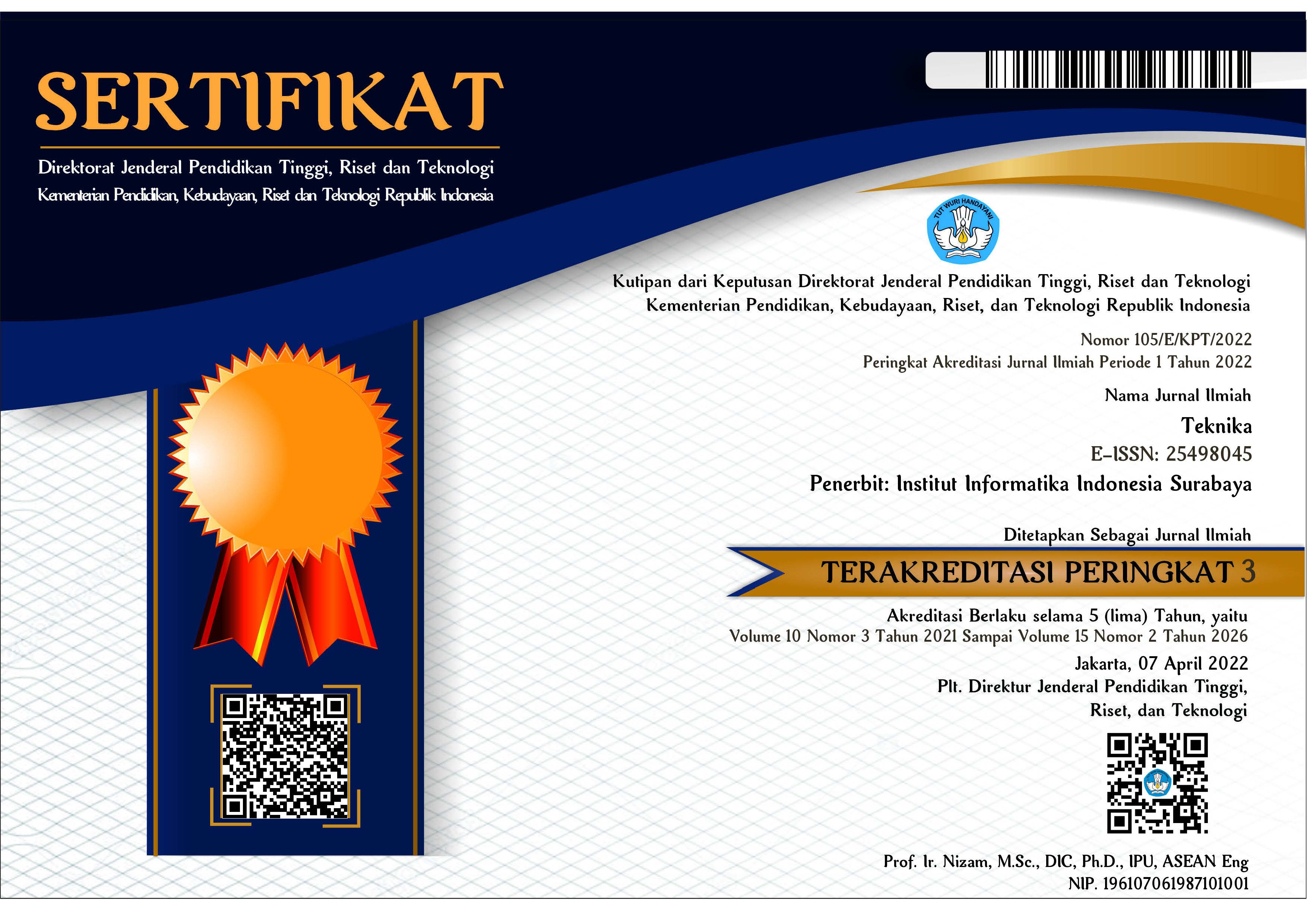The Role of Information and Communication Technology in Advancing Sustainable Energy Transition in Developing Countries: Progress, Opportunities and Challenges
DOI:
https://doi.org/10.34148/teknika.v13i3.1068Keywords:
Digitalization, Information, Communication Technology, Smart Grid, Sustainable EnergyAbstract
Sustainable energy transitions in developing countries are critical for balancing economic growth and environmental sustainability. Transitioning to renewable energy sources alleviates energy poverty and reduces reliance on fossil fuels. Information and communication technology (ICT) plays an important role in advancing the energy transition and achieving low-carbon energy utilization by facilitating the transition of power sectors to renewable energy sources. This paper provides an overview of the role of ICT in achieving sustainable energy transition in developing countries and jurisdictions. It emphasises the significance of SDG 7 and other sustainable energy transition indices for energy access and transition, as well as presenting their status and progress in various regions, including developing countries. This paper also discusses several types of available ICT tools and methods that enable digitalization in the power sector, such as smart grids, smart metres, energy management systems, Internet of Things (IoT) for energy, and renewable energy monitoring systems, as well as the opportunities and challenges of incorporating ICT into the context of developing countries' sustainable power sector.
Downloads
References
D. Gielen, F. Boshell, D. Saygin, M.D. Bazilian, N. Wagner and R. Gorini, “The role of renewable energy in the global energy transformation,” Energy Strategy Reviews, vol. 24, pp. 38-50, Apr. 2019, doi: 10.1016/j.esr.2019.01.006.
G. Schwerhoff and M. Sy, “Financing renewable energy in Africa – Key challenge of the sustainable development goals,” Renewable and Sustainable Energy Reviews, vol. 75, pp. 393-401, Aug. 2017, doi: 10.1016/j.rser.2016.11.004.
Z.A. Elum and A.S. Momodu, “Climate change mitigation and renewable energy for sustainable development in Nigeria: A discourse approach,” Renewable and Sustainable Energy Reviews, vol. 76, pp. 72-80, Sept. 2017, doi: 10.1016/j.rser.2017.03.040.
D. Bogdanov, M. Ram, A. Aghahosseini, A. Gulagi, A.S. Oyewo, M. Child, U. Caldera, K. Sadovskaia, J. Farfan, L.D.S.N.S. Barbosa, M. Fasihi, S. Khalili, T. Traber and C. Breyer, “Low-cost renewable electricity as the key driver of the global energy transition towards sustainability,” Energy, vol. 227, 120467, Jul. 2021, doi: 10.1016/j.energy.2021.120467.
M.M.V. Cantarero, “Of renewable energy, energy democracy, and sustainable development: A roadmap to accelerate the energy transition in developing countries,” Energy Research & Social Science, vol. 70, 101716, Dec. 2020, doi: 10.1016/j.erss.2020.101716.
M. Murshed, “Can regional trade integration facilitate renewable energy transition to ensure energy sustainability in South Asia?” Energy Reports, vol. 7, pp. 808-821, Nov. 2021, doi: 10.1016/j.egyr.2021.01.038.
Jonathan Cloke, A. Mohr and E. Brown, “Imagining renewable energy: Towards a Social Energy Systems approach to community renewable energy projects in the Global South,” Energy Research & Social Science, vol. 31, pp. 263-272, Sep. 2017, doi: 10.1016/j.erss.2017.06.023.
M. Murshed, “An empirical analysis of the non-linear impacts of ICT-trade openness on renewable energy transition, energy efficiency, clean cooking fuel access and environmental sustainability in South Asia,” Environmental Science and Pollution Research, vol. 27, pp. 36254-36281, Jun. 2020, doi: 10.1007/s11356-020-09497-3.
P. Tzeremes, E. Dogan and N.K. Alavijeh, “Analyzing the nexus between energy transition, environment and ICT: A step towards COP26 targets,” Journal of Environmental Management, vol. 326, part A, 116598, Jan. 2023, doi: 10.1016/j.jenvman.2022.116598.
M.H. Rehmani, M. Reisslein, A. Rachedi, M.E. Kantarci and M. Radenkovic, “Integrating renewable energy resources into the smart grid: Recent developments in information and communication technologies,” IEEE Transactions on Industrial Informatics, vol. 14, issue. 7, pp. 2814-2825, Jul. 2018, doi: 10.1109/TII.2018.2819169.
J. Kouton, “Information communication technology development and energy demand in African countries,” Energy, vol. 189, 116192, Dec. 2019, doi: 10.1016/j.energy.2019.116192.
M. Shahbaz, J. Wang, K. Dong and J. Zhao, “The impact of digital economy on energy transition across the globe: The mediating role of government governance,” Renewable and Sustainable Energy Reviews, vol. 166, 112620, Sep. 2022, doi: 10.1016/j.rser.2022.112620.
D.M. Collum, L.G. Echeverri, K. Riahi and S. Parkinson, “SDG 7 ensure access to affordable, reliable, sustainable and modern energy for all. Accessed: Sep. 3, 2024. [Online]. Available: https://pure.iiasa.ac.at/id/eprint/14621/1/SDGs-interactions-7-clean-energy.pdf
IBRD, “Tracking SDG7: The energy progress report 2023,” Accessed: Sep. 1, 20204. [Online]. Available: https://www.irena.org/Publications/2023/Jun/Tracking-SDG7-2023
I. Gunnarsdottir, B. Davidsdottir, E. Worrell and S. Sigurgeirsdottir, “Review of indicators for sustainable energy development,” Renewable and Sustainable Energy Reviews, vol. 133, 110294, Nov. 2020, doi: 10.1016/j.rser.2020.110294.
IAEA, “Energy Indicators for Sustainable Development: Guidelines and Methodologies,” Accessed: Aug. 30, 2024. Available: https://www-pub.iaea.org/mtcd/publications/pdf/pub1222_web.pdf
P. Maroufkhani, K.C. Desouza, R.K. Perrons and M. Iranmanesh, “Digital transformation in the resource and energy sectors: A systematic review,” Resources Policy, vol. 76, 102622, June 2022, doi: 10.1016/j.resourpol.2022.102622.
B. Lin and C. Huang, “Promoting variable renewable energy integration: The moderating effect of digitalization,” Applied Energy, vol. 337, 120891, May 2023, doi: 10.1016/j.apenergy.2023.120891.
M. Loock, “Unlocking the value of digitalization for the European energy transition: A typology of innovative business models,” Energy Research & Social Science, vol. 69, 10740, Nov. 2020, doi: 10.1016/j.erss.2020.101740.
Energy System 4.0: Digitalization of the Energy Sector with Inclination towards Sustainability, “ Sensors, vol. 22, no. 17, 6619, Sep. 2022, doi: 10.3390/s22176619.
G.R. Barai, S. Krishnan and B. Venkatesh, “Smart metering and functionalities of smart meters in smart grid - a review,” in Proc. 2015 IEEE Electrical Power and Energy Conference (EPEC), London, ON, Canada, 2015, pp. 138-145.
L. Bastida, J. Cohen, A. Kollmann, A Moya and J. Reichl, “Exploring the role of ICT on household behavioural energy efficiency to mitigate global warming,” Renewable and Sustainable Energy Reviews, vol. 103, pp. 455-462, Apr. 2019, doi: 10.1016/j.rser.2019.01.004.
T. Ahmad and D. Zhang, “Using the internet of things in smart energy systems and networks,” Sustainable Cities and Society, vol. 68, 102783, May 2021, doi: 10.1016/j.scs.2021.102783.
M.H. Maruf, M.A. Haq, S.K. Dey, A.A. Mansur and A.S.M. Shihavuddin, “Adaptation for sustainable implementation of Smart Grid in developing countries like Bangladesh,” Energy Reports, vol. 6, pp. 2520-2530, Nov. 2020, doi: 10.1016/j.egyr.2020.09.010.
G.G. Dranka, P. Ferreira, “Towards a smart grid power system in Brazil: Challenges and opportunities,” Energy Policy, vol. 136, 111033, Jan. 2020, 10.1016/j.enpol.2019.111033.
P. Pandiyan, S. Saravanan, R. Kannadasan, S. Krishnaveni, M.H. Alsharif and M.K. Kim, “A comprehensive review of advancements in green IoT for smart grids: Paving the path to sustainability,” Energy Reports, vol. 11, pp. 5504-5531, Jun. 2024, doi: 10.1016/j.egyr.2024.05.021.
Archana, R. Shankar and S. Singh, “Development of smart grid for the power sector in India,” Cleaner Energy Systems, vol. 2, 100011, Jul. 2022, doi: 10.1016/j.cles.2022.100011.
Suwanto, N. Shani, J. Tjioe, R. Safrina, A. Dwi Wahyono and B. Suryadi, “Smart Grid in ASEAN: Overview and Opportunities to Support the ASEAN Renewable Energy Aspirational Target,” Accessed: Sep. 1, 2024. [Online]. Available: https://aseanenergy.org/publications/smart-grid-in-asean-overview-and-opportunities-to-support-the-asean-renewable-energy-aspirational-target/
PLN, “Press Release No. 323.PR/STH.00.01/VI/2023: PLN Segera Gunakan “AMI” Tahun Ini, Meteran Canggih yang Bikin Pelanggan Bisa Monitor Penggunaan Listrik Secara Realtime (in Bahasa Indonesia)” Accessed: Sep. 2, 2024. [Online]. Available: https://web.pln.co.id/media/siaran-pers/2023/06/pln-segera-gunakan-ami-tahun-ini-meteran-canggih-yang-bikin-pelanggan-bisa-monitor-penggunaan-listrik-secara-realtime
J.S. Jones, “Thailand – lessons from a 116,000 smart meter rollout,” Smart Energy International. Accessed: Sep. 2, 2024. [Online]. Available: https://www.smart-energy.com/regional-news/asia/thailand-lessons-from-a-116000-smart-meter-rollout/
N.A. Utama, “ASEAN perspective on grid reliability,” ASEAN Centre for Energy. Accessed: Sep. 2, 2024. [Online]. Available: https://aperc.or.jp/file/2024/5/9/S3-3_Dr.Nuki_Agya_Utama.pdf























